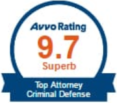Skilled Financial Crimes Defense Lawyer
in Madison, Georgia

Being suspected of a crime – even a non-violent crime such as a financial crime – can be terrifying, even with a financial crime lawyer in Georgia by your side. Your character and integrity are called into question, as well as your professional ethics and abilities if the alleged crime involved your business dealings. Even the hint of anything illegal could be enough to tarnish or forever ruin your reputation, which could in turn destroy your career, and a conviction could result in severe consequences such as prison time or substantial fines.
If you are currently facing charges – or believe you may soon face charges – for alleged involvement in any type of financial crime in Georgia, you need an experienced Georgia financial crime lawyer like those at Michael Fulcher Law fighting on your behalf.
The best time to seek legal counsel for a financial crime is before you are charged. Cases involving financial fraud are complex and require a lot of time and investigative resources on the part of the state, which may give them an advantage. If you suspect that you, your company, or any business dealings may be the subject of a criminal investigation, it is imperative that you speak with a skilled financial crime attorney in Georgia as soon as possible.
Common types of financial crimes in Georgia
Often referred to as “white-collar crimes,” financial crimes are typically nonviolent offenses that involve fraud and the theft or illegal use of money or other assets. Financial crimes may be committed by individuals, professionals, businesses, corporations, or government officials. These types of crimes often involve some level of deceit, including the abuse of a position of trust. In other words, people or entities that commit white-collar financial crimes often leverage their role as an authority figure – for example, as a government official – to steal funds or to deceive others into providing access to financial information which they can then use illegally.
Depending on the circumstances and the severity of the offense, including how much money or assets were involved, a white-collar crime may be classified as either a misdemeanor or a felony. The accused may face civil penalties in addition to criminal charges. Again, this depends on the specific circumstances of the case. Every case is different and requires a strategic approach from a financial crime lawyer in Georgia designed to achieve the best possible outcome.
Financial crimes that are considered relatively common include:
Credit or Debit Card Fraud
Stealing another person’s credit card information with the intent to charge purchases to the account or remove funds from the account is considered credit card or debit card fraud. This may involve the physical theft of someone’s credit or debit card, or the unauthorized use of their credit or debit card numbers and details. Illegal purchases and withdrawals may be made in person, online, or via the telephone.
In a fraud case involving credit card or debit card fraud, the prosecution must prove that the defendant intentionally used the unauthorized or illegally obtained card information. If, however, the defendant mistakenly used someone else’s card or unintentionally used a card that had expired or been cancelled, they may not be held criminally liable.
Credit or Debit Card Theft
Credit or debit card theft occurs when a person:
- Takes a credit or debit card from the card owner without their consent
- Knowingly possesses a stolen credit or debit card without the owner’s consent with the intent to use it or sell it
- Knowingly possesses a credit or debit card that has been lost or delivered to the wrong person with the intent to use it or sell it
- Buys a lost, stolen, or forged credit or debit card from another person
- Possesses two or more lost, stolen, or forged cards within one year.
Like all criminal prosecutions, to be convicted of credit or debit card theft, the State must prove all of the elements of the crime beyond a reasonable doubt, a heavy burden on the State. This burden requires that the State prove that the defendant had the intent to use, sell, or forge the credit card information. Penalties are steep. A felony conviction means up to $5,000 in fines and a prison term of between 1 and 5 years, or both. And a felony conviction impacts all aspects of your life. Upon release, a felony conviction can impede employment, credit, and housing, as well as ripping apart your family.
Embezzlement
In a general sense, embezzlement is a form of theft that involves a betrayal of trust or duty. It is the theft of money or property by a person in a position of trust or responsibility over the stolen assets. This includes people such as accountants, bankers, employees, legal guardians, and others who are in a position to steal or misuse the money or property they are supposed to be protecting. Embezzlement can also be committed by a government employee.
Interestingly, while most states use the term embezzlement, Georgia law typically does not. Instead, Georgia law refers to the crime as “conversion” and requires that the stolen funds or property were initially obtained legally.
According to Georgia law, a person is considered to have committed embezzlement when they obtain another person’s funds or property, including leased or rented property, in a lawful manner and under an agreement or other legal obligation for the specific application or use of said property, but then knowingly convert those funds or that property for their own use in violation of the original agreement.
The penalties for embezzlement depend on the value of the property converted. If valued at $500 or more, the crime can be charged as a felony, with a prison sentence of 1-10 years.
Identity Fraud
Also known as identity theft, in its most simple sense, identity fraud involves the unlawful theft and use of someone else’s personally identifying information, such as their Social Security Number, to commit other crimes like credit card fraud. This can be an incredibly invasive crime that can damage or even ruin the victim’s credit scores and financial life, which can in turn hurt their housing and career prospects. Ultimately, identity fraud can impact a victim’s life on multiple levels, leaving them cleaning up the mess for years to come.
In Georgia, identity theft is considered a felony and is punishable by a minimum of one year in prison and up to 10 years in prison, at the judge’s discretion. If found guilty, the defendant may also be fined up to $100,000 dollars in addition to any prison sentence. If you or someone you love has been accused of committing identity fraud, you need the help of a skilled Georgia financial crimes attorney.
Theft by Shoplifting
Shoplifting involves concealing merchandise with the intent to steal it, in other words, to leave the store without paying for the item, or items. It is not a defense to a charge of shoplifting that the theft was not completed, for instance, you were stopped by a security guard or sales associate before you actually removed the merchandise from the store without paying for it. Shoplifting also encompasses swapping containers or price tags to pay a lower price for an item or altering a UPC label to get a lower price.
Penalties depend on the value of the merchandise. A misdemeanor is charged if the property is valued at $500 or less. Higher valued property over $500 results in a felony charge with a 1-10 year prison sentence and the possibility of an accompanying civil case brought by the store owner to recover the value of the property along with punitive damages of three times the value of the property stolen.
Prosecutors can file felony charges for cumulative shoplifting thefts that add up to over $500 over a six-month period.
And repeat offenders can be sentenced to boot camp or ordered to undergo psychological evaluation and treatment.
RICO Crimes
A person involved in a pattern of racketeering to acquire or maintain any interest in or control of any type of property or business can be charged under federal or Georgia RICO law. RICO means “racketeer influenced and corrupt organizations.” RICO charges are complex, requiring that the State prove beyond a reasonable doubt that you participated in a pattern of criminal activity motivated by or resulting in monetary gain, achieved through economic or physical threat of injury.
To be convicted under Georgia’s RICO statute, the State must prove that the defendant committed two or more predicate crimes; that those underlying predicate crimes were committed as part of an ongoing enterprise that resulted in the defendant acquiring or maintaining control of any business, real or personal property; and that the defendant was employed or associated with the enterprise. The predicate crimes can include, for example: homicide, theft, fraud, perjury, commercial bribery, drug distribution, drug trafficking, arson, burglary, influencing witnesses, tampering with witnesses or victims, kidnapping, and false testimony.
RICO is a felony charge with severe penalties under Georgia law. Upon conviction, a defendant can be sentenced to 5-20 years in prison, with fines of $25,000 or three times the amount of pecuniary gain from the criminal activity, whichever is greater, or both. The State can charge separately the RICO offenses as well as the underlying predicate crimes, increasing the possibility of a longer prison term.
Extortion
Extortion is a crime in Georgia, and occurs when one person unlawfully obtains another’s property through oral or written threats, intimidation, or false claims. Extortion covers a broad range of activities to obtain another’s property:
- Accuse the other person of a crime
- Commit an additional crime against the alleged victim
- Distribute personal information pertaining to the alleged victim that will cause embarrassment or ridicule
- Inflict bodily harm
- Take or withhold action as a public official, or cause a public official to take or withhold action
- Cause a strike or boycott of the property the accused wishes to obtain
- Refuse to testify about important information that is helpful to another person’s legal case or defense
Penalties can range from 1-10 years in prison.
Other Financial Crimes
There are an array of additional financial crimes that can be charged in Georgia, all resulting in substantial penalties, both fines and prison time. These additional financial crimes include:
- Bribery
- Embezzlement
- Forgery
- Fraud
- Insurance Fraud
- Bribery in connection with a false claim
- Securities Fraud
- Mortgage Fraud
- Tax Evasion
Contact A Financial Crimes Defense Lawyer in Georgia
An experienced financial crime lawyer in Georgia knows how to examine an indictment and accompanying evidence to uncover the weaknesses within the State’s case. These weaknesses can arise from the investigation; any warrants that were issued; the seizing of property, documents, computers, mobile phones, and other evidence; any arrests; and the identification and examination of witnesses.
The State must prove beyond a reasonable doubt all of the elements of any of these financial crimes. Hiring a knowledgeable financial crime lawyer in Georgia to represent you eases the stress of a prosecution and affords you the representation you deserve to ensure a fair criminal procedure.
CALL US NOW
FOR A FREE CONSULTATION
Facing legal challenges, whether it’s a DUI, criminal charge, or navigating traffic-related offenses, requires a skilled advocate. Turn to Morgan County’s Michael Fulcher Law for a blend of legal expertise and unwavering client service from a former Georgia prosecutor. Discover the optimal legal solution for your situation by calling our criminal defense law firm at (706) 438-1555 or reaching out online. Schedule your free consultation today and gain a clearer path forward.
AMAZING WORK
“Mr. Fulcher has been tremendously helpful with my case. Since hiring him he has consistently returned my calls as quickly as he can. We discussed an ideal outcome, and I set about doing exactly as he said. Following his advice we were able to get a very favorable outcome. He is always quick to answer any questions, and has stayed very engaged with me throughout this ordeal. Michael provides excellent counsel, and I would recommend him to anyone!”
— TOM




